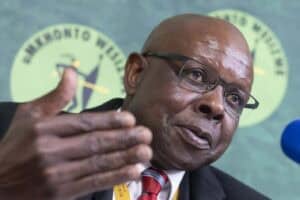Spokesperson Nathi Mncube said in a statement late on Sunday that the matter would be clarified.

The Office of the Chief Justice has set out to clarify events preceding the complaints laid by Western Cape High Court Judge President John Hlophe and his deputy Patricia Goliath, saying he was aware of the allegations since late 2019.
Chief Justice Mogoeng Mogoeng, however, does not have the legal authority to personally resolve the matter, a statement from his office said.
Following a number of media queries, spokesperson Nathi Mncube said in a statement late on Sunday that the matter would be clarified.
In January, Goliath lodged a gross misconduct complaint against Hlophe, alleging that he compromised the functioning of the Western Cape High Court, News24 previously reported.
She alleged there was preferential treatment for his wife, that he assaulted and verbally abused two judges, and attempted to influence the appointments of judges seen as favourable to former president Jacob Zuma in presiding over the “Earthlife Africa” case, which involved the nuclear deal.
Hlophe then filed a counter-complaint, dismissing the allegations, and accused Goliath of a “malicious and bad-faith attempt to generate public outrage, lynching and condemnation of my leadership of the division that would support calls for my immediate suspension and removal”.
Mncube explained that Mogoeng became aware of the strained relationship between Hlophe and Goliath, when Goliath asked for a meeting with Mogoeng on 11 October, 2019.
“Deputy Judge President Goliath informed the chief justice that her relationship with Judge President Hlophe had become difficult.
“She also said that two judges had informed her about an alleged assault on one of them by Judge President Hlophe,” Mncube said.
“Although she said nothing about her intention to lodge a complaint against the judge president concerning their relationship, she however indicated that the judge who was allegedly assaulted by the judge president was thinking about doing so,” he added.
Goliath also informed Mogoeng that the victim she spoke about was uncertain about whether it was appropriate to report the alleged assault to the police and the Judicial Conduct Committee (JCC) because the victim believed Mogoeng would see this as bringing the judiciary into disrepute.
“At the request of the alleged victim of the assault and another judge, she had come to find out from the chief justice whether he would have any principled objection to the allegations being reported to the police and the JCC.
“The chief justice told her that any allegation of misconduct against any judge must, in terms of the code of judicial conduct and the Judicial Service Commission (JSC) Act, be reported to the JCC.
“Additionally, any allegation of a commission of a crime must, without hesitation, be reported to the South African Police Services,” Mncube explained.
He added that Mogoeng also informed Goliath that a failure by a judge to report such allegations to the authorities would be “a betrayal of what judgeship or the judiciary is all about”.
“The chief justice stands by this position and would always encourage any alleged wrongdoing or alleged crime to be reported promptly.”
Mncube reiterated that Mogoeng did not have the legal authority to deal with these issues outside of the processes under the JSC Act.
“To suggest otherwise could either be actuated by nefarious reasons (eg, a long-standing desperation to find fault) or misapprehension of the law.
“So far, none of those who have asked the chief justice to intervene in the Western Cape High Court could, when he pertinently asked them to, point to any provision in the Constitution, JSC Act, any other Act of Parliament, any regulation or rule that empowers him to discipline a judge or cause him or her to be suspended as many have suggested.
“Instead, they have suggested that he either pleads with Judge President Hlophe to go on leave or somehow use the ‘prestige’ of his office to ‘normalise’ the Western Cape situation,” Mncube added.
He said Mogoeng has been aware of the allegations against Hlophe since 2019, but that the allegations can only be resolved through the appropriate application of the law.
“It is necessary to emphasise that he does not have the power to resolve these challenges and cannot, therefore, exercise power that he does not have,” Mncube said.
In March, the JCC decided that the two complaints should be referred to Deputy Chief Justice Raymond Zondo, for him to designate a member to hold an inquiry, News24 reported.
An inquiry could either dismiss one or both complaints; find that one or both complaints have merit and the respondents be hit with remedial steps; or still find that either one or both complaints should be referred for investigation and reported on by a tribunal.
For more news your way, download The Citizen’s app for iOS and Android.






